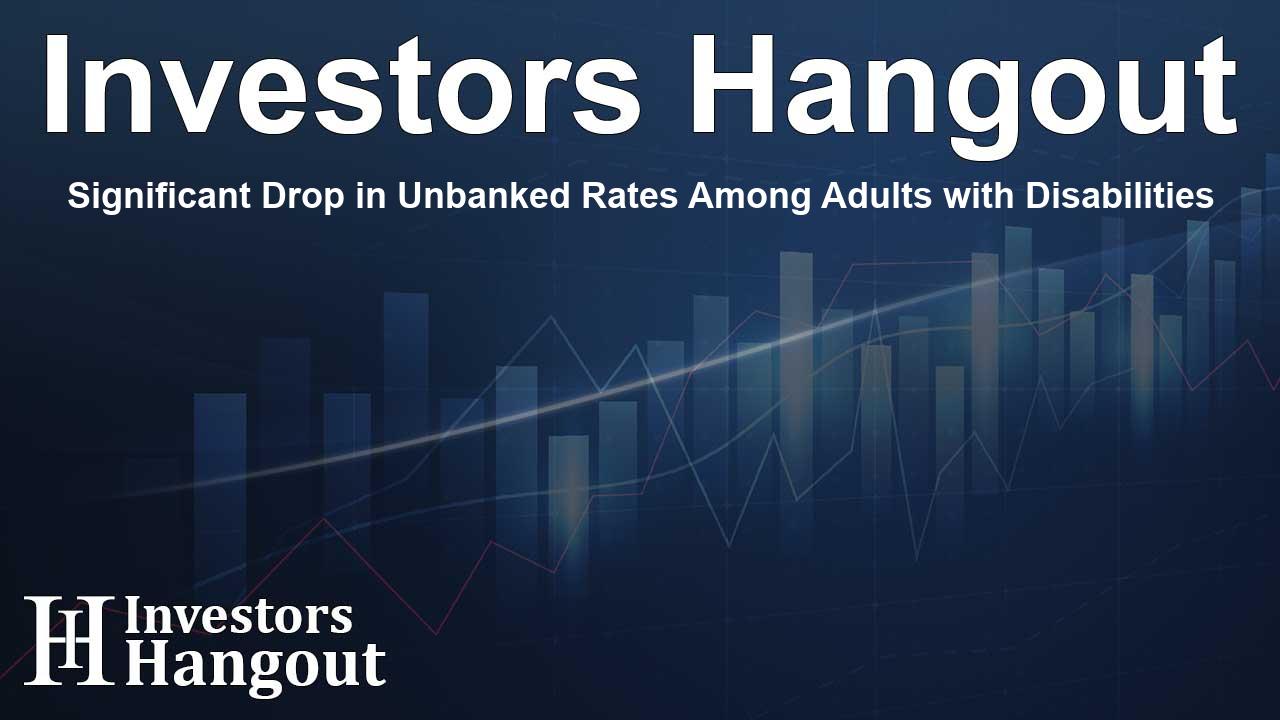Significant Drop in Unbanked Rates Among Adults with Disabilities

Unbanked Rate Declines for Adults with Disabilities
The National Disability Institute (NDI) has announced exciting news regarding the financial landscape for working-age adults with disabilities. Recent data reveals a 38 percent decrease in the unbanked rate for this demographic, a significant milestone in their journey toward financial inclusion and empowerment.
Impact of Financial Inclusion
According to NDI Executive Director Thomas Foley, this reduction is a meaningful step forward, allowing improved access to vital financial services such as mortgages and credit. He highlights that the findings reflect a growing participation of individuals with disabilities in the financial system, showcasing their determination to secure brighter financial futures for themselves and their families. Foley asserts, "It's good for people with disabilities, it's good for banks, and it's good for the American economy." The numbers speak volumes, indicating a transformative trend toward greater economic mobility.
Current Unbanked Statistics
The comprehensive unbanked rate across all demographics saw a remarkable decrease, with figures plummeting from 8.2 percent in previous years to 4.2 percent. Despite this progress, a noticeable disparity continues to exist for those with disabilities, who experience a higher unbanked rate of 11.2 percent. This rate, although significantly lower than before, still indicates that nearly three times as many households with disabilities are unbanked compared to those without disabilities. The overall reduction over the years is commendable, particularly with a 24 percent decrease observed just between 2021 and 2023.
Key Findings on Unbanked Households
The data brings to light several critical observations regarding unbanked households. In 2023, working-age households with disabilities represented 21.5 percent of all unbanked households, a notable improvement from 26.9 percent in previous years. Additionally, the long-term decline is significant; the unbanked rate for this group has fallen from 18.3 percent in 2009 to the current 11.2 percent.
Challenges Still Persist
Despite these achievements, challenges remain. Households with disabilities are still disproportionately affected, being three times more likely to be unbanked and significantly less likely to use mobile banking as their primary banking method. Furthermore, access to mainstream credit is still a major hurdle, as many continue to face barriers despite the overall progress made.
Future Directions for Financial Inclusion
Foley stressed the importance of recognizing the achievements made while acknowledging the ongoing need for improvement. He underlined the necessity for continued efforts to ensure financial access for all, stating that bridging these gaps is crucial for empowering millions of individuals with disabilities. Through strategic collaborations with financial institutions and policymakers, NDI aims to create a more inclusive economic landscape where everyone can fully participate in the financial ecosystem.
About National Disability Institute
National Disability Institute (NDI) plays a pivotal role in advocating for a better financial future for people with disabilities and their families. Being the first organization of its kind focused exclusively on economic empowerment, NDI is committed to fostering financial education and stability. By engaging in public education, policy development, and innovative initiatives, NDI strives to create impactful change in the lives of individuals with disabilities.
Frequently Asked Questions
What does the recent data reveal about unbanked adults with disabilities?
The recent data indicates a 38 percent decline in the unbanked rate among working-age adults with disabilities, reflecting increased financial inclusion.
How does this impact the financial ecosystem?
This shift toward greater inclusion benefits not only individuals with disabilities but also financial institutions and the wider economy.
What are the current unbanked rates for this demographic?
The unbanked rate for working-age households with disabilities stands at 11.2 percent, almost three times higher than that for households without disabilities.
What barriers remain for people with disabilities?
Despite progress, households with disabilities are still three times as likely to be unbanked and have limited access to mobile banking and mainstream credit.
How is NDI addressing these challenges?
NDI is dedicated to furthering economic inclusion through outreach to financial institutions and policymakers, aiming to enhance financial access for individuals with disabilities.
About The Author
Contact Henry Turner privately here. Or send an email with ATTN: Henry Turner as the subject to contact@investorshangout.com.
About Investors Hangout
Investors Hangout is a leading online stock forum for financial discussion and learning, offering a wide range of free tools and resources. It draws in traders of all levels, who exchange market knowledge, investigate trading tactics, and keep an eye on industry developments in real time. Featuring financial articles, stock message boards, quotes, charts, company profiles, and live news updates. Through cooperative learning and a wealth of informational resources, it helps users from novices creating their first portfolios to experts honing their techniques. Join Investors Hangout today: https://investorshangout.com/
The content of this article is based on factual, publicly available information and does not represent legal, financial, or investment advice. Investors Hangout does not offer financial advice, and the author is not a licensed financial advisor. Consult a qualified advisor before making any financial or investment decisions based on this article. This article should not be considered advice to purchase, sell, or hold any securities or other investments. If any of the material provided here is inaccurate, please contact us for corrections.
